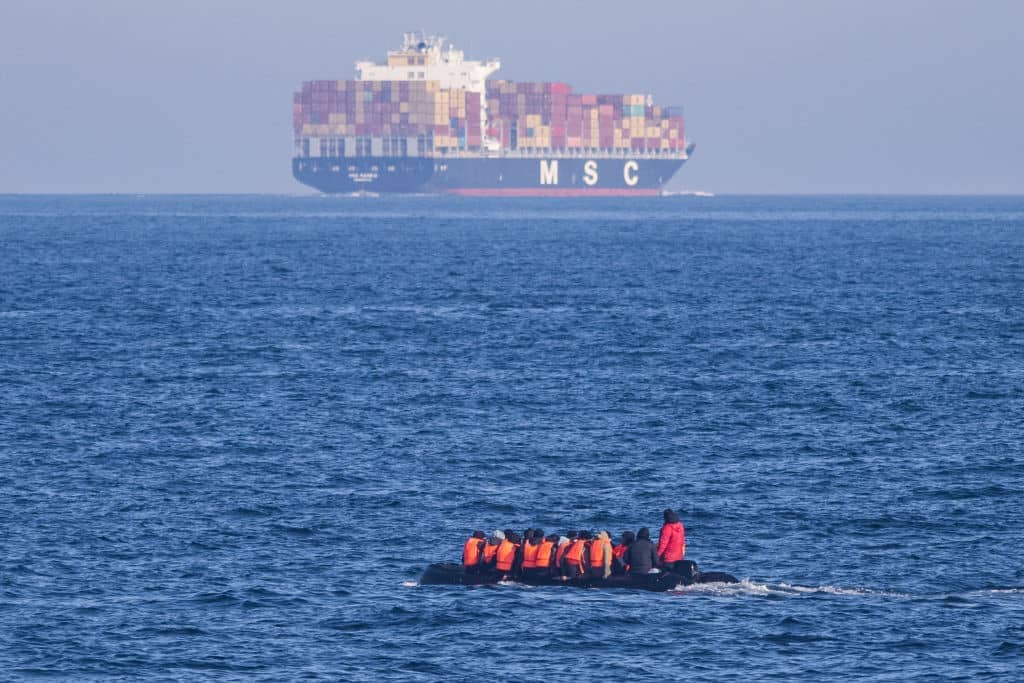Away from the well-merited focus on Ukraine, normal politics carries on in Britain. One has to poke around a bit to find it, but there are several issues, rendered all but invisible, that will weigh heavily on the minds of voters at the next general election. Rather than Russian barbarism in Ukraine, it is these things that will determine Boris Johnson’s fate.
Britain’s broken immigration and asylum system is close to the top of the list. Among Leave voters, it is the second most important political topic, above healthcare and defence and security. Eclipsed only by economic pressures, Boris cannot afford to ignore what is happening in the Channel. Yet still his government is burying its head in the sand: the ‘Channel-hopping’ phenomenon under which predominantly young men gain unlawful entry to the UK by paying people traffickers to ferry them across from France in dinghies is running at record levels.
Already more than 4,500 such entrants have been recorded in the first three months of the year. This is more than twice the number who arrived in the first three months of 2021, which was itself easily a record year. With the high season for crossings about to start it can already be predicted with confidence that on current trends the 28,500 arrivals of 2021 will be very comfortably eclipsed. We are heading for 50,000 plus new arrivals.
It is hardly a surprise then to find that one of beleaguered Home Secretary Priti Patel’s traditional over-the-rainbow ruses has been trotted out again: the idea of processing these arrivals offshore to deter the traffic.
Britain is now said to be close to a deal to house future Channel hoppers at a camp in Rwanda
Britain is now said to be close to a deal to house future Channel hoppers at a camp in Rwanda. Ascension Island, Albania and Ghana have previously been floated as possible locations for offshore processing, all of which have subsequently been ruled out. This time Government sources have been quoted saying Boris Johnson has been told the deal with Rwanda is ‘not quite ready’ pending Patel’s Nationality and Borders Bill, which contains powers to facilitate processing abroad, getting royal assent.
Cynics among us who have tired of reading these speculative reports and yet seeing no follow through, may wonder how close we actually are to action. There was certainly little reassurance offered by refugees minister Lord Harrington this week, when he said he had heard nothing about it. He told LBC there was ‘no possibility’ of refugees being sent to Rwanda.
The implementation of such a policy, if it does go ahead, will provoke one of the biggest political rows of recent years. Most elite opinion, including a big slug of Tory MPs, will condemn it in the strongest terms.
Yet shying away from it after so much chuntering would be far more costly to the Conservatives. It would prove once and for all to Brexit voters that they never had any real intention of making good on their pledge to ‘take back control’ of UK borders.
Sheer practicality also implies that a tougher new approach to the Channel migrants must be adopted. When Michael Gove unveiled his scheme to allow British families to accommodate Ukrainians fleeing the war last month, he openly admitted it had been devised in the face of extraordinary pressure on the Government’s capacity to house people. As he put it:
‘One of the reasons why we are using this scheme is because quite a lot of the capacity that one might otherwise want to use to house refugees is already being used.’
The huge cross-Channel influx of 2021 is one of the main causes of a steep rise in the number of asylum-seekers living in British hotels at taxpayers’ expense. Meanwhile some 12,000 Afghans invited in under authorised schemes last year are also still stuck in hotels, so acute is the shortage of suitable long-term social housing. Another year or two of further unchecked increases in the Channel-hopping phenomenon is going to completely overwhelm the state’s coping capacity. Something simply has to give.
The argument is there to be won that the British state will only be able to be generous and compassionate to people brought in under official refugee schemes – whether from Hong Kong, Ukraine, Afghanistan, Syria or elsewhere – if it is not lumbered with the burden of also putting up thousands of people who have arrived without authorisation from a safe country.
Were those who chance their arm in this way seen to end up further away from the UK than where they began their journeys, the incentives to pay people traffickers would be removed. Those who tot up the potential cost per person of offshore processing and claim it to be exorbitant are in the main wilfully ignoring this deterrent effect.
After nearly three years of waffle and prevarication from ministers – ever since Boris Johnson’s own promise to the Channel-hoppers in the summer of 2019 that ‘we will send you back’ – something useful may finally be about to happen.







Comments